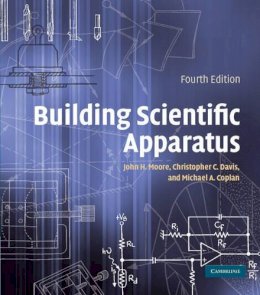
Stock image for illustration purposes only - book cover, edition or condition may vary.
Building Scientific Apparatus
John H. Moore
€ 134.76
FREE Delivery in Ireland
Description for Building Scientific Apparatus
hardcover. An essential step-by-step guide on the construction of scientific apparatus for all scientists and students in physics, chemistry, biology and engineering. Num Pages: 658 pages, 552 figures. BIC Classification: PDN. Category: (P) Professional & Vocational; (U) Tertiary Education (US: College). Dimension: 247 x 220 x 63. Weight in Grams: 1680. 662 pages, 552 figures. Essential step-by-step guide on the construction of scientific apparatus for all scientists and students in physics, chemistry, biology and engineering. Cateogry: (P) Professional & Vocational; (U) Tertiary Education (US: College). BIC Classification: PDN. Dimension: 247 x 220 x 63. Weight: 1668.
Unrivalled in its coverage and unique in its hands-on approach, this guide to the design and construction of scientific apparatus is essential reading for every scientist and student of engineering, and physical, chemical, and biological sciences. Covering the physical principles governing the operation of the mechanical, optical and electronic parts of an instrument, new sections on detectors, low-temperature measurements, high-pressure...
Read moreProduct Details
Publisher
Cambridge University Press
Number of pages
658
Format
Hardback
Publication date
2009
Condition
New
Number of Pages
658
Place of Publication
Cambridge, United Kingdom
ISBN
9780521878586
SKU
V9780521878586
Shipping Time
Usually ships in 4 to 8 working days
Ref
99-6
About John H. Moore
John H. Moore is Professor Emeritus at the University of Maryland. He is a Fellow of the American Physical Society and the American Association for the Advancement of Science. His research has included plasma chemistry, high-energy electron scattering, and the design and fabrication of instruments for use in the laboratory and on spacecraft. Christopher C. Davis is Professor of Electrical...
Read moreReviews for Building Scientific Apparatus
'This new edition includes updates throughout, and will continue to serve as a bookshelf standard in laboratories around the world. I never like to be too far from this book!' Jason Hafner, Rice University, Houston, Texas '… the first book I reach for to remind myself of an experimental technique, or to start learning a new one. With valuable additions...
Read more